Well before the publication of Start-Up Nation, American investors and tech gurus knew that Israeli engineers had a special knack for creating high-tech and silicon-based companies.
The market has produced some large exits of hundreds of millions of dollars, and smaller exits of a handful of millions, so investors are keen for entrée to the Israeli scene. But most are usually locked out.
Spread the Word
• Email this article to friends or colleagues
• Share this article on Facebook or Twitter
• Write about and link to this article on your blog
• Local relevancy? Send this article to your local press
In Israel, angel investors speak the language of the local talent and find ways to access the companies from the ground up, where stakes are high. But American angel investors who also want a piece of the investment pie, and the thrill of investing early in what could be the next Waze, lack that fluency.
Janvest to the rescue: The four-partner investment firm –– a team of two young American-Israeli upstarts and two senior investment execs from Israel –– gathers small angel investors from around the United States and Canada to invest in Israeli high-tech. They have closed their first round of funding of $5 million earmarked for about 10 companies, and are just opening their second round. Investors with as little as $100,000 can be part of the energy.
Filtering out risks and worries
“We are a risk mitigator,” says founding partner Daniel Frankenstein, 31, formerly a business consultant based in San Francisco.
“One of the interesting things about the Israeli market,” he says, “is that we have the opportunity to do a few things: We play a large role in these organizations’ business support in Israel or business development in the US. We operate in a gap in the investment market that allows us to get larger chunks of more mature and more interesting companies.”
In America, he says, there is a well-developed investment ecosystem: “If you don’t have an ‘in’ it’s hard to get into a premium pre-IPO investment. Those who do it share deals among themselves.”
Frankenstein joins forces with Brian Rosenzweig, also 31, from Philadelphia, with a clean-tech and emerging-tech background. Together they scour North America looking for investors. Many of those they find are also in the win-win position to open business development doors to the Israeli companies.
Financials and accounting are all done in English, in US standards, so it is easy for an Israeli company to report its operations expenses to investors on a regular basis.
“It’s not just about capital, but advisory,” Rosenzweig emphasizes. “Very rarely do the companies say that they don’t need this. Entrepreneurs need help figuring out where and when to market. The holy grail is the American market and exiting to an American company for some price,” he says.
Busting the VC monopoly
Frankenstein points out that Janvest wants to stick with the way Israeli entrepreneurs have been dreaming of doing business lately: micro-exits. These are the stories of companies like Lab Pixies, sometimes no more than 18 months old, that achieve a quick exit in the range of $25 million.
Most bigger venture capital firms would expect their investment in a company to show big returns and thus a bigger exit, to make an investment worthwhile.
“We take the Israeli mentality and structure our business so what’s happening there is a profitable event. In early and out earlier,” says Rosenzweig.
A $100,000 seed investment in Janvest would buy an angel investor equity in about 10 to 12 companies. Some $300,000 to half a million is invested in each portfolio company, representing the areas of ecommerce, digital media, online security and the IT space.
Who has Janvest invested in so far? There is Sensegon, a psychosocial digital advertising platform that targets ads based on your personality.
There is also Sevenpop, a social jukebox for the retail space. In a bar or at the Gap and want to change what you’re hearing? The company lets you use your smartphone to control the playlist.
Consider Biocatch, a company based in Lod that has developed a cyber-security system based on how you move your finger and mouse on the computer screen. Its CEO is pretty happy with Janvest so far.
Biocatch CEO Benny Rosenblum says: “Janvest made it very clear in the beginning that as investors, they would be true partners as well — aiding in the development and marketing of our technology both in Israel and the US. So far, they have stuck to their word and to the benefit of Biocatch.”




